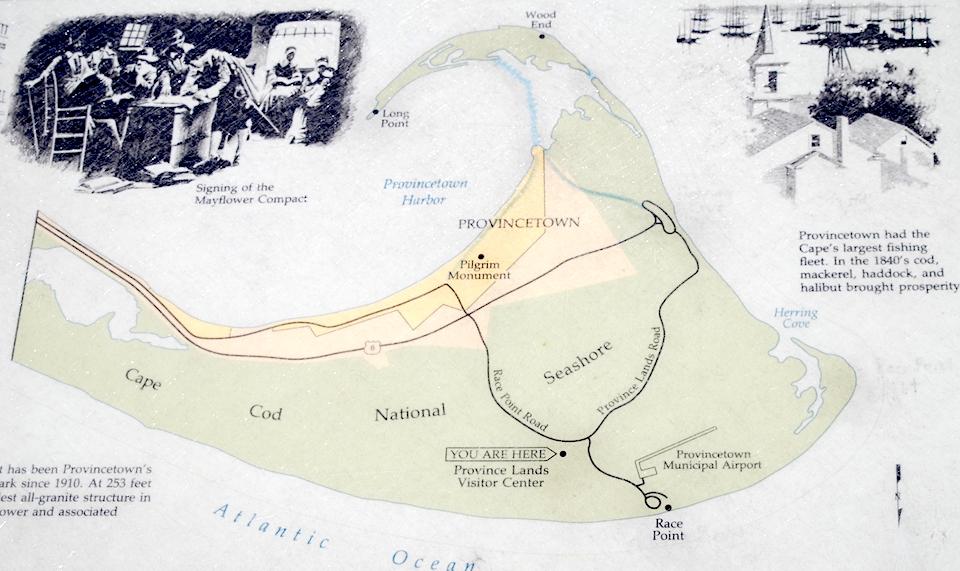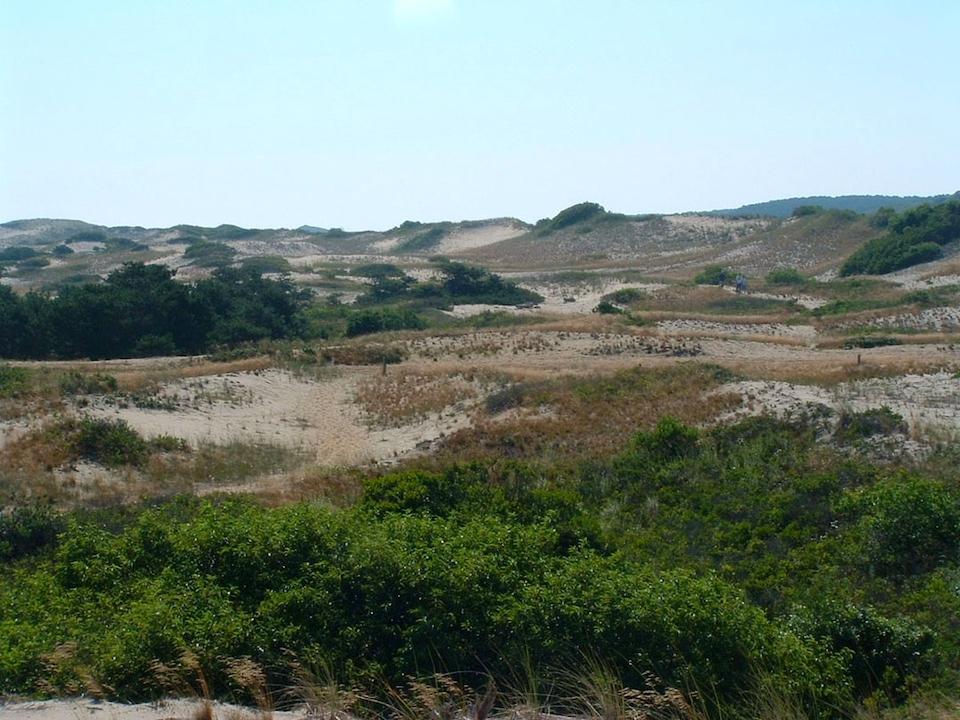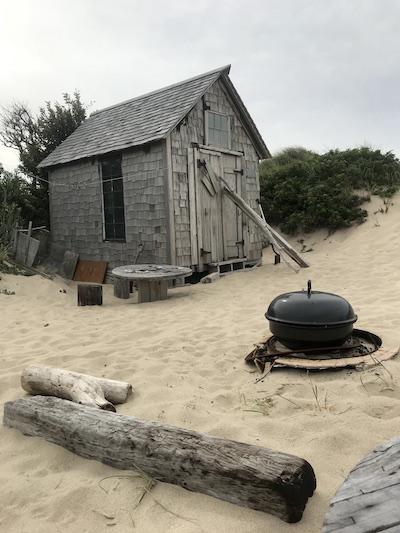
The coronavirus pandemic has tossed uncertainty into the summer expectations for chamber bureaus and businesses on Cape Cod/Kurt Repanshek file
Provincetown, Mass., is no stranger to crowds. Sitting at the tip of the flexed bicep-shaped Cape Cod peninsula, at the end of U.S. 6 that skirts along Cape Cod National Seashore, the picturesque and historic seaside town sees its population swell considerably during most summers. When beach season kicks off each May, the population of roughly 2,300 year-round residents balloons to some 65,000 visitors, seasonal workers, and second homeowners, many from New York, Connecticut, and Rhode Island. Big events like the annual weeklong Provincetown Carnival in August can draw as many as 100,000 revelers.
But prior to the onslaught of the Covid-19 pandemic, this year had all the makings of blowing those numbers completely out of the water as the town planned to celebrate the 400th anniversary of the pilgrims’ first landing in Provincetown and the signing of the Mayflower Compact in 1620. According to estimates from the Pilgrim Monument and Provincetown Museum, quadricentennial events were estimated to attract another 500,000 visitors through autumn, a visitation record-breaker of colossal proportions.
A full slate of Provincetown 400 anniversary activities are planned through November, but some of the earlier events have been postponed or cancelled. The festivities include concurrent opening ceremonies celebrating the Mayflower landings in Provincetown and Plymouth and the culture of the indigenous Wampanoag people, featuring historic reenactments, concerts, art shows and galas. The Mayflower II replica ship is scheduled for a five-day berth in Provincetown Harbor in September, coinciding with a visit of the Greater Society of Mayflower Descendants.
Anniversary events are scheduled to culminate in early November with fireworks and the annual lighting of the Pilgrim Monument. But all of these massive crowd-intensive events are up in the air, and the opening ceremonies, initially scheduled for April, have already been postponed to late June. P'town’s popular Family Week and Bear Week, both set for July, have also been cancelled.
Massachusetts Gov. Charlie Baker has extended the state’s stay-at-home order from the initial expiration date of May 4 to May 18. All public buildings in Cape Cod National Seashore were closed on March 16, with a reopening date set for May 18. Beaches, trails, and parking areas have remained open, but off-road vehicle permits will not be available until May 19. There have been no announcements regarding changes to ferry service to Provincetown from Boston or Plymouth, scheduled to begin mid-May and mid-June, respectively.
As of April 27, Provincetown had one death from complications related to Covid-19, two confirmed active cases, and 25 additional cases considered recovered and cleared from quarantine.
In many communities serving national parks and seashores, the chambers of commerce are playing a vital role in keeping the business community apprised of current coronavirus situations as they unfold. In Provincetown, the chamber works closely with its members through daily email blasts, phone calls, and social media updates.
“We’re all in this together, and communication is key,” said Radu Luca, executive director of the Provincetown Chamber of Commerce, a 300-member organization.
“Our members don’t know what to expect,” Luca said. “We don’t know when we’ll be able to open, we don’t know if once we’re open people will feel comfortable enough to travel, go to a restaurant or be out in public. Quite a few summer event weeks have been postponed or cancelled already. So there’s a lot of uncertainties, and staying in business is a major concern.”

The dunes around Provincetown long have attracted visitors/NPS file
To cope with the uncertainty, an 18-member Provincetown Recovery Coalition has been formed to address best policy and procedures for reopening the town. This advisory panel to the town manager has representation from local businesses, the tourism industry and public health. The chamber president is also a member.
“The coalition is charged with finding innovative, out-of-the-box solutions to help with the current situation,” Luca explained. Recommendations will be forwarded to the town manager who will, in turn, pass them along to the Select Board (Provincetown’s five-member governing body) for possible implementation.
“The coalition has just put together a survey for businesses, stakeholders, and residents asking them to brainstorm solutions to help the business community,” Luca said, describing one recent initiative. The Local Chamber Collaborative, which Luca chairs, is also actively addressing the concerns of businesses. The collaborative is a panel of 15 chamber directors from towns along the Cape that, according to Luca, “meets monthly to discuss best practices, what we’re doing for our members and our communities, and the best way to reach audiences.” Information is then shared among chamber members. He said his chamber also works with the larger Cape Cod Chamber of Commerce, which is comprised of 16 tourism councils in Massachusetts.
“The real worries, from what I’ve heard, come from our hotel, guest house, and rental property owners,” Luca said. “Clearly, they’ve had cancellations in April and May, but they’re seeing a real dip in reservations for the rest of the summer -- June July and August. Also, the reservations are not coming in at the rate that they normally would. And we’re seeing a dip from reservations from abroad. So we’re encouraging owners to work with their guests and find a middle ground, either offering them a credit for later dates or rescheduling them.”
Another wrench in the works for Provincetown is the limited availability of traditional J-1 and H-2B summer workers. Both the J-1 Visa Exchange Visitor Program and the H-2B Work Visa allow foreign students and other nationals to enter the U.S. to fill temporary positions.
“A lot of businesses rely on J-1 and H-2B seasonal workers,” Luca said. “Some restaurants that rely on this workforce don’t know if they’ll be able to open their doors and whether they’ll have the staff necessary to open to the public. A lot of shops employ J-1 students from Eastern Europe, and quite a few restaurants that are open through October, November, and December hire H-2B workers from Eastern Europe and Jamaica.
“We’re trying to stay positive,” Luca concluded. “Personally, I’m hoping for at least a good second part of the summer and/or fall. The fall season – or as we call it our second summer season – September, October and November -- is pretty strong. We usually see a lot of visitors after Labor Day, and many people prefer to be here in October. As long as the weather cooperates, we’ll hopefully see a lot of visitors. We’ll see what happens.”
Dune Tour Operator Scaling Back
From Eastham to Provincetown, the pavement of U.S. 6 in summer normally funnels seemingly endless streams of Cape Cod visitors past crowded seafood shacks, restaurants and pizza joints, by miniature golf courses, cabin rentals, roadside motels and campgrounds, and past inviting art and antique galleries. There are narrow and winding sideroads that dart off to national seashore and town beaches on the Atlantic side of the cape as well as on Cape Cod Bay, and to hidden rental properties overlooking the water that attract the same guests year after year.
To most, if not all, of these businesses, the coronavirus pandemic is a threat to their livelihood. Owners of two longstanding businesses in Provincetown are waiting to see what happens, monitoring the situation daily, and making necessary adjustments to accommodate safety and social distancing requirements while still staying afloat.
Art’s Dune Tours offers a variety of excursions that navigate off-road sand trails through magnificent dunes, marshes, and other scenic spots within the historic district of the roughly 40-mile-long national seashore. Carrying on the tradition of his father who started the business 74 years ago carting folks around in his 1936 Ford Woody, Costa’s excursions provide a touch of history and promote awareness of the Cape’s fragile ecosystems. The company’s offerings include daytime and sunset dune tours, upgraded with lobster and clambakes as requested. Dune tours with other add-ons are also available, including fishing and boating, watercolor painting and photography, and tours to the Race Point lighthouse, and historic artist shacks found perched within the Peaked Hill Bars Historic District.
With a fleet of eight Chevrolet Suburbans and a Jeep Wranger, Costa says he’s already planning to sideline three of the vehicles this season, making do with six to handle whatever business comes his way.
“This is uncharted territory, and we really don’t know what to expect,” Costa said. “We suspect if we can keep to the guidelines of state and local laws, we can fill the trucks up with maybe two or four people or a family of four, five, or six and not mix strangers together. That’s our goal.”

Touring the Peaked Hill Bars Historic District to enjoy the dunes and spy the dune shacks long has brought tourists to the Provincetown area/Kurt Repanshek file
The company typically loads the Suburbans with up to seven passengers.
“We’re definitely looking at less revenue, but everyone is,” he added. “With fewer trucks on, there’s fewer expenses and fewer employees to drive them so we’ll see.”
Art’s Dune Tours typically employs some 30 mostly part-time staff during peak season, including administrative personnel and 25 drivers. Most are recruited locally.
Costa, who also serves on the board of the Provincetown Chamber of Commerce, has developed a safety protocol for his business.
“We’ve got foggers on order to sanitize the entire inside of the Suburbans between each trip. We’re going to have one entrance and one exit into the office with spacing stations and hand sanitizing stations. We’re requiring everyone to wear a mask, including our drivers. We’re going to run the trucks with the windows open, and we’re not going to crowd the trucks out unless it’s a family.”
Plexiglas shields for his registers are also on order.
“I’m trying to be optimistic,” he said. “We’re not going to get the volume we normally get, but that’s okay. We’ll just make do. I think people are going to want to get out of the house, and they’re going to want to feel somewhat safe and secure. So I think by installing as many safety precautions as possible, people will appreciate it.”
Cancellations Outnumber Reservations For Whale Watches
Dolphin Fleet Whale Watch’s four-vessel operation serves up unique and educational excursions throughout the protected Stellwagen Bank National Marine Sanctuary. Each trip features informal, yet informative, presentations by naturalists knowledgeable about whale behavior and other marine life. Humpback whale spottings provide the biggest thrills, but it’s common to see other remarkable creatures, including a variety of whale species, dolphin, sharks and sea birds, within the sanctuary.
In response to the growing popularity in recent years of whale-watching adventures, the newest addition to the fleet – the Dolphin XI – was brought on in 2019. Custom-built for the company by Gulf Craft, Inc., the boat runs with cleaner emissions and offers passengers the choice of three levels for staking out the best viewing positions.
Accustomed to running up to 10 trips per day during peak season, with up to 260 passengers on board, the company is in idle mode, anxiously awaiting an official start to its 44th season. Jay Hurley manages group and corporate sales for the company, and said he’s trying to adhere to a ‘business as usual policy.’
“We don’t know anything. We don’t know when we’ll start, and we don’t know what the restrictions may be if there are any. It’s an interesting time for sure.”
With reservations rapidly being scratched from the books, Hurley says the company has been ‘crazy busy.’
“All I’m doing is taking cancels. I’ve got stuff on the books for 2021, and talking to people about 2022. What I try to do especially with the groups I had in the spring is move them to fall and see what happens then. It depends on the groups. A lot of them are seniors who come from Ohio or Pennsylvania on the motor coaches, and they tend to be a little more cautious. We don’t even know when we’re starting so if we have somebody in May, we’re cancelling and refunding the money.”
Whale Watch Dolphin fleet staffs some 100 employees, many overseas college kids in the J-1 and H-2B.
“Everybody’s scratching their head,” Hurley said. “I do sales, but I may be selling tickets, too. It’s going to be one of those season where everyone is going to have to step up to the plate and do what needs to be done.”
Hurley believes the company will be able to survive at half-capacity, but acknowledges that other businesses won’t be able to do the same.
“We’ll be fine, but it is a huge hit. It is scary for the small guys out there.”



Comments
Thank you for this post. We are scheduled for August and if its safe for everyone we will be there but taking precautions just like we do at home. Our owner isnt sure about rentals even after Gov. Baker's announcement. The Phases could slide backwards if it all goes to fast. We will however, support as many businesses as possible. We love Ptown. It is our home away from home.